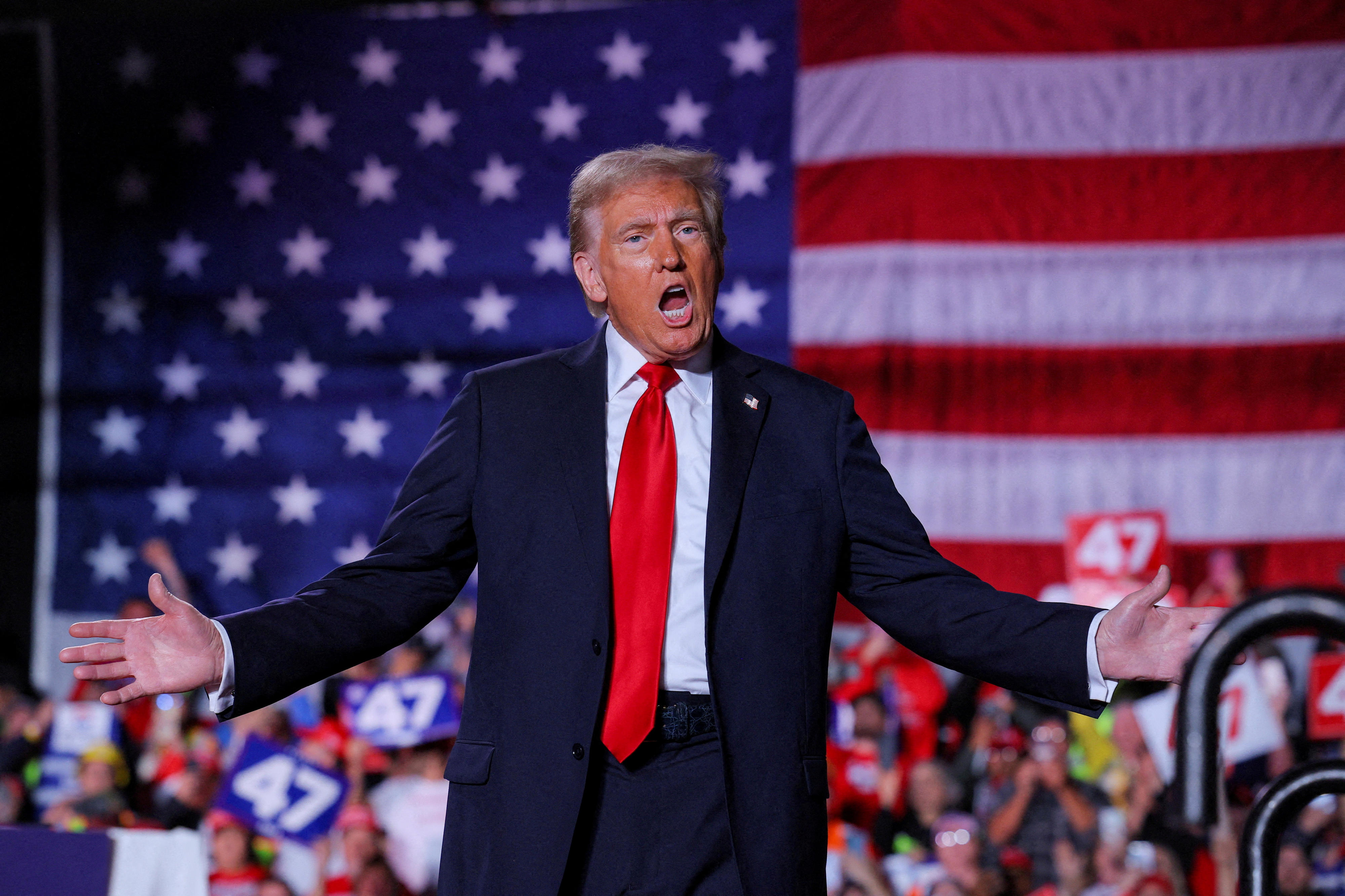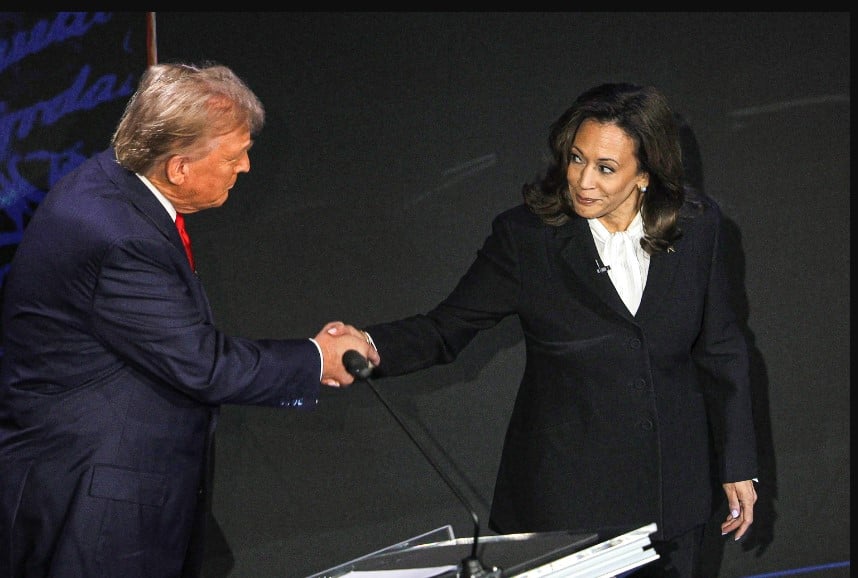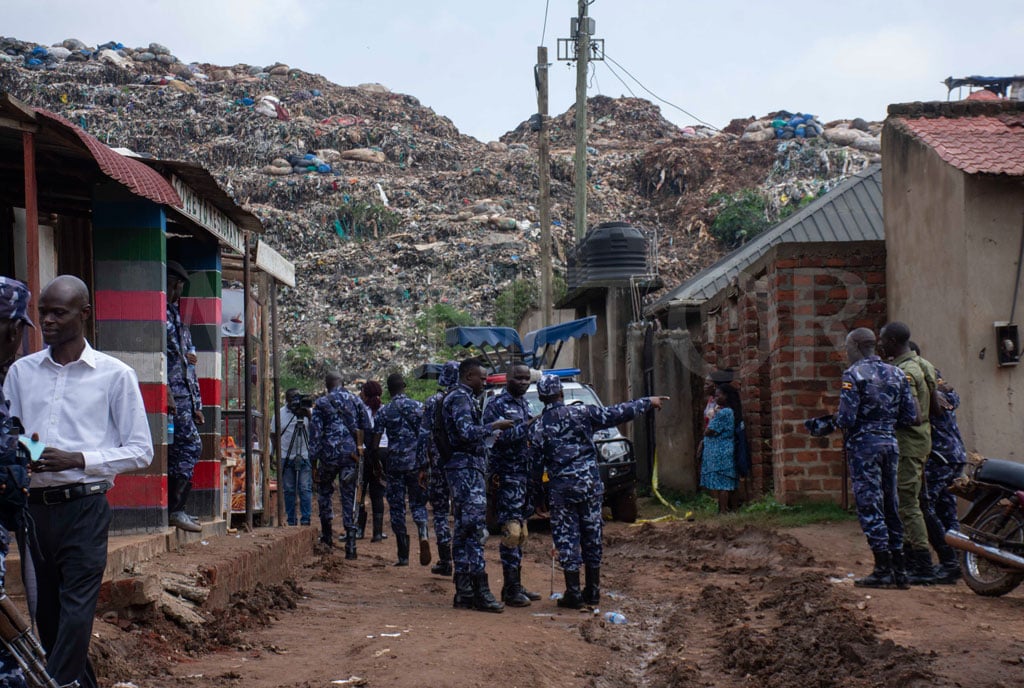
Republican presidential nominee and former U.S. President Donald Trump attends his campaign rally at Macomb Community College in Warren, Michigan, U.S., November 1, 2024. PHOTO/ REUTERS
Like the rest of world, African governments are waiting apprehensively for US President-elect Donald Trump’s return to the White House on January 20 for another four years of uncertainty.
The world still recalls that his first term in office, between 2017 and 2021, was marked by economic nationalism, ‘America First’, and a transactional foreign policy. He discontinued the US’ involvement in key pacts, including the Trans-Pacific Partnership and Paris Climate Agreement, railed against the
North Atlantic Treaty Organisation (NATO), accusing some member countries of not paying dues, disdained multilateral groupings such as the UN; and took on China, stoking inflames in
international trade.
Besides labelling African countries, Haiti and El Salvador as“shithole”once in 2018, he never hid his disinterest in Africa, and the Kampala government, often juggling Washington’s errands in the Great Lakes region, and the majority others, featured less in his foreign policy calculus. To the surprise of
many, he never rolled back many of his country’s commitments on the continent as was widely expected.
He did host a handful of African leaders to the White House; Egyptian President Abdel Fattah al-Sisi, and then former presidents of Nigeria and Kenya, Muhammadu Buhari and Uhuru Kenyatta respectively, for bilateral talks. President Museveni managed a brief encounter and photo opportunity with him on the sidelines of the UN General Assembly in September 2017, and never returned to the US until December 2022 for the second US-Africa summit.
For the second term in office starting January, uncertainty and unpredictability abound after Mr Trump and his Republican party took lock, stock, and barrel of the three arms of the US government setting stage for a stormy shakeup, of not just foreign policy that will reverberate near and far.
While most of the new administration’s agenda will be known in due course, some pundits have opined and are concerned about the ‘Project 2025’ document, drawn by one of Washington’s most prominent conservative think tanks, Heritage Foundation, being at the centre stage of Mr Trump’s actions.
While campaigning in July, Mr Trump denied knowledge of the policy blueprint document, saying: “I have no idea who is behind it.”
The American cable news channel, CNN, however later wrote that “at least 140 people who worked in the Trump administration had a hand in Project 2025.”
The 900-page Right Wing wish list, among others, proposes a total overhaul of the entire US government establishment. On Sub-Saharan Africa, the document details that the US taking its foot off the gas pedal on the continent over the years has led to China’s meteoric influence, from diplomatic engagements to trade.
The document proposes that the new “administration can correct this strategic failing of existing policy by prioritising Africa and by undertaking fundamental changes in how the United States works with African nations.”

Chinese President Xi Jinping with other African leaders at the BRICS Summit, in Johannesburg, South Africa, on August 24, 2023. Africa’s continued endearment to China is a concern to many US diplomats. PHOTO/REUTERS
Furthermore, the document proposes countering malign Chinese activity on the continent.
“This should include the development of powerful public diplomacy efforts to counter Chinese influence campaigns with commitments to freedom of speech and the free flow of information; the creation of a template “digital hygiene” programme that African countries can access to sanitise and protect their sensitive communications networks from espionage by the People’s Republic of China (PRC) and other hostile actors,” the document reads in part.
“The recognition of Somaliland statehood as a hedge against the US’ deteriorating position in Djibouti; and a focus on supporting American companies involved in industries important to US national interests or that have a competitive advantage in Africa,” the document adds.
Rethinking focus
The document also details a rethinking of US core diplomatic activities, and stop promoting policies birthed in the American culture wars.
“African nations are particularly (and reasonably) non-receptive to the US social policies such as abortion and pro-LGBT initiatives being imposed on them. The US should focus on core security, economic, and human rights engagement with African partners and reject the promotion of divisive policies that hurt the deepening of shared goals between the U.S. and its African partners,” the 900-page document reads in part.
Whether the Project 25 agenda is an official policy document is yet to be known. But days after trouncing Vice President Kamala Harris in the November 5 polls, Mr Trump started naming
choices for the coveted positions in his cabinet. Key among them is his former rival and Florida Senator Marco Rubio, known for his hawkish stance on Cuba and Venezuela, as next Secretary of
State, pending Senate approval.
The G77+China alliance, currently chaired by Uganda until next January, has been critical of the US’ sanctions regime on Cuba and Venezuela. The two communist countries are among the world’s most sanctioned countries, by the US and its European allies, alongside Russia, Iran, North Korea, Syria, and Myanmar.
Mr Rubio is no novice to diplomacy. He serves on the Senate Foreign Relations Committee where he has, among others, co-sponsored amendments to the UN Participation Act of 1945— which allows US participation in the UN— to provide for a prohibition on contributions to the UN related to discrimination against Israel, and the Indian Ocean Region Strategic Review Act of 2024, for facilitating military relations between Washington and the 17 Indian Ocean region states.
In sharp contrast, during his first term in office in 2017, which was rocked by upheaval from the early days due to, among others, appointment of novices to key positions, President Trump tapped energy executive Rex Tillerson as his first Secretary of State but fired him March 2018.
After months of uncertainty about the first Trump administration’s relationship with Africa, Mr Tillerson on November 15, 2017, convened the annual African Union-US High Level Dialogue and Ministerial meeting for discussions on galvanising and “broadening” Washington’s agenda in Africa.
Uganda’s then Foreign Affairs minister Sam Kuteesa, who served as president of the United Nations General Assembly in 2015, was among the 37 African Foreign Affairs ministers invited for the meeting in Washington DC.
From DC, Mr Kuteesa was scheduled to fly to Hungary. He cancelled the trip during layover in London after the US Department of Justice named him in an unsealed indictment of a Chinese national, Patrick Chi Ping Patrick Ho, and Cheikh Gadio for “participating in a multi-year, multimillion-dollar scheme to bribe high-level officials” in Chad and Uganda.
During his maiden trip to Africa, which took him to Chad, Djibouti, Ethiopia, Kenya, and Nigeria, later in March 2018, Mr Tillerson underscored Washington’s “longstanding commitment to supporting and defending,” among others, democracy and governance on the continent. The same countries he visit-
ed are big recipients of Chinese loans.
So he took a swipe at Beijing by urging African governments to “carefully consider the terms of those agreements (with China) and not forfeit their sovereignty.”
China’s Foreign Minister Wang Yi later in a rejoinder said “Africa’s concerns are China’s concerns. Africa’s priorities are China’s priorities.”
Overall, counteracting China’s influence in Africa was among the first Trump administration’s policy realignment, albeit with little success.
Bigger fish to fry
For Uganda, which runs security errands in the Great Lakes region to capture imagination of Washington and the EU across the Atlantic, the first shock came in January 2017 when the Trump transition team queried whether it is worthwhile for the US government to continue involving itself the fight against the Lord’s Resistance Army (LRA) rebels in Central African Re-
public and Al-Shabaab in Somalia.
“We’ve been hunting [Lord’s Resistance Army rebel group leader Joseph] Kony for years, is it worth the effort?” read in part a questionnaire the Trump team sent out respectively to the State
Department and Department of Defence (Pentagon). “The LRA has never attacked US interests, why do we care?
Is it worth the huge cash outlays? ...
Even the Ugandans are looking to stop searching for him, since they no longer view him as a threat, so why do we?”
President Trump’s predecessor Barack Obama had in October 2011 dispatched some 100 US Special Forces soldiers to reinforce the UPDF in the hunt for Kony who is believed to be hiding in
the CAR jungles. The US placed a $5m bounty on Kony, who is also wanted by the International Criminal Court (ICC).
The UPDF started withdrawing from CAR later in 2017.
Ugandan diplomats, speaking anonymously, called for cautious optimism, citing the old days of going to bed or waking up not knowing what to expect.
“What is true is that the Republican style is different; and particularly [Mr] Trump is a deals person, for him you are with us or against us. The Biden era has been so ideology- and values-driven, human rights- and governance-driven, which stopped them from engaging much with governments like Kampala. They were so disdained,” a senior Ministry of Foreign Affairs official in Kampala said on condition of anonymity.
The official added: “And now that they (Republicans) are in control of the three arms of government; that is a reality check. But for what is worth, they are pragmatists.”
Another diplomat in Kampala opined: “The Trump of today is without a day better than the Trump of 2017 – 2021. What we know for sure is that the attitude towards Africa or policy for that matter won’t change much.”
Journalist/ social researcher Yusuf Serunkuma also opined that “Africa should expect continuity with the status quo.”
“[President] Trump will be preoccupied with Russia, the Middle East and internal problems, which were his campaign promises. On the other hand, the bureaucrats will be hard at work on
policies that secure American interests; the conflict in Sudan, ensuring that an Islamist president doesn’t take charge, strengthening ties with Kenya, which gives them a stronghold in the region,” Dr Serunkuma said.
US interests ‘constant’
Except, he added: “The political players, especially in Sub-Saharan Africa, haven’t much or are weak: President [William] Ruto is more servile than [President] Kenyatta; ours is concerned with survival; the one in South Sudan is weak; DR Congo is a mess, so all I can see is continuity.....but not being preoccupied with small issues like gay rights, human rights as the Democrats would have done.”
President Trump’s lack of prior experience in politics or government, during his first term, was to some extent fathomable but his unorthodox methods, pronouncements and approaches are what worried most around the world. However, the bureaucracy in Washington always kept him in check.
With another four years ahead, the world is edgy again. However, like before, it is unlikely that Africa will be a key agenda for the second Trump presidency which is good news for rogue African governments.

President Museveni with his Russian counterpart Vladimir Putin at the US-Africa summit in Moscow in 2019
Speaker of Parliament Anita Among during plenary on November 5 remarked: “The sanctions are gone.” She was referring to the travel ban and assets freeze slapped on her, her husband
Moses Magogo Hassim,the former Deputy Chief of Defence Forces, Lt Gen Peter Elwelu, State Minister for Finance (Planning) Amos Lugolobi, and two former Karamoja ministers Mary Goretti Kitutu and Agnes Nanduttu.
In December 2020, in the run-up to the January 2021 polls that pitted President Museveni against popstar-turned politician Robert Kyagulanyi, the chairperson of the American Congressional
Committee on Foreign Affairs, Mr Eliot Enge,l wrote to the Trump-era secretaries of State and Treasury, asking them to punish top Ugandan military officials over allegations of human rights abuses.
Mr Engel singled out the then commander of Land Forces, Lt Gen Peter Elwelu, the then commander of Special Forces,Maj Gen James Birungi, the then Deputy Inspector General of Police, Maj
Gen Steven Sabiiti Muzeyi and the commander of Ugandan troops in Somalia, Maj Gen Don Nabaasa. Others were the now former Chief of Military Intelligence, Maj Gen Abel Kandiho, the director of police Crime Intelligence, Col Ddamulira Sserunjogi, and the former commander of Kampala Metropolitan Police, Mr Frank Mwesigwa, who is currently the director of operations.
The outgoing President Biden administration in April 2021 completed the action, by announcing a blanket travel ban on government and military officials involved in undermining democ-
racy during and after the January 14 election campaigns.
One high ranking official described as making a mountain out of a molehill with Mr Trump’s ascent and what his relationship in Africa will be, arguing that while administrations and priori-
ties change, interests seldom do, regardless of who is in power.
President Trump’s unorthodox modus operandi, Dr Serunkuma argued, is what makes him enigmatic.
“The US foreign policy is not dependent on who is in power; the one who’s in power is more like a public relations person, while in the shadows, the bureaucrats are hard at work on foreign
policy. You also have to appreciate that in this equation of global contest, Africa is the weakest as compared to China or Russia. Some African presidents who are largely colonial caretakers, are weak or are bullyable..so they are not an issue at all,” he said.
Africa/Uganda in Trump’s agenda Regardless of concerns about his isolationist agenda towards Africa and largely the Global South, and especially now that Republicans control both
houses of Congress, several African leaders, including President Museveni, congratulated President-elect Trump for winning the elections.
“We, the freedom-loving people of Uganda, look forward to mutually beneficial engagement with your administration,” President Museveni said in a message shared on his official X account.
For Mr Museveni, who at his inauguration in 1986 said Africa’s problem is leaders who overstay in power, and has met all previous US presidents since, the Democratic Party administrations of President Obama between 2009 and 2016 and President Biden from 2017 to date have posed major headaches for him; routinely flagging his long stay in power and increasing governance deficiency, including choking of the civic space as the ruling NRM party entrenches in power.
In March 2016, the then US Permanent Representative to the UN, Ms Samantha Power, launched a blistering attack on Mr Museveni, saying his long stay in power was a threat to Uganda’s future stability.
Inversely, Uganda does security leg work in the region for the US and EU, more significantly fighting al-Shabaab in Somalia, and playing its diplomatic power favourably at international fora.
In return, Washington gives Uganda nearly $1 billion each year, mainly for health and security support. The EU is also a huge funder of Uganda’s development aspirations.
While President Museveni has severally publicly expressed his anger with the West and called China and Russia “Africa’s only true friends”, he still remains the West’s point man in the region, especially on security. He is currently playing an active role in mediating the Sudan conflict, having been appointed by the African Union.
On the other hand, Uganda lost its diplomatic clout in Washington DC after the hounding out of the former Ambassador Mull Katender, who was one of the handful of career diplomats in Uganda’s Foreign Service, as a result of machinations in the Ministry of Foreign Affairs. His successor, Ms Robbie Kakonge who started her tour of duty in August 2021, has been learning the ropes on the job.
Uganda was last year cast out of the African Growth and Opportunity Act, which was passed by Congress in 2000 to allow select sub-Saharan African countries duty-free access to the US for more than 1,800 products. The US has no significant business investment in Uganda, which goes to show that Kampala will likely be on the fringes.






